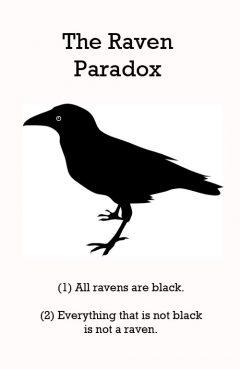The Raven Paradox (aka Hempel's paradox or Hempel's ravens)

Release Date: //
Country of Release:
Length:
MPAA:
Medium: Paradox
Genre:
Release Message: All ravens are black. Authored by Carl Hempel.
Description: The Raven paradox, also known as Hempel's paradox or Hempel's ravens is a paradox arising from the question of what constitutes evidence for a statement. Observing objects that are neither black nor ravens may formally increase the likelihood that all ravens are black even though intuitively these observations are unrelated. Observing a green apple increases the likelihood of all ravens being black. This problem was proposed by the logician Carl Gustav Hempel in the 1940s to illustrate a contradiction between inductive logic and intuition. A related issue is the problem of induction and the gap between inductive and deductive reasoning.